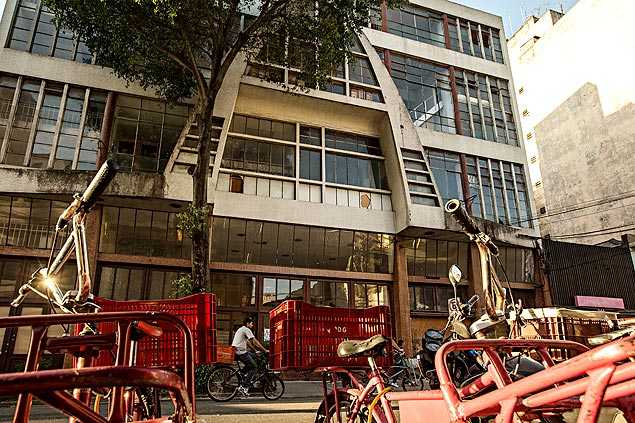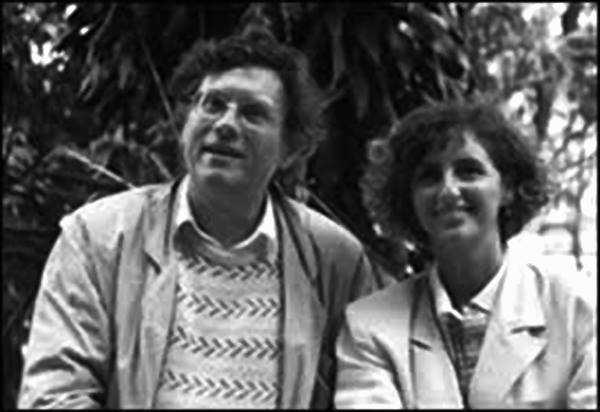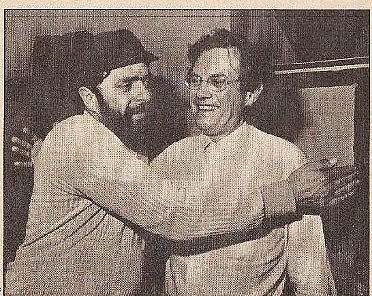2014 - 2015 Roaming Academy ~ Grant Watson, Yael Davids & Wanderley Santos present: To Make a Work ~ Molecular Revolutions
Guest tutors: Thijs Witty, Wendelien van Oldenborgh
Seminar leaders in São Paulo: Suely Rolnik, Peter Pál Pelbart, Paula Cheiffi and others
In collaboration with the Nucleo of Subjectivity at PUC and Casa do Povo, both based in São Paulo.
Participants DAI: Jan Adriaans, Julieta Aguinaco, Katia Barrett, Ben Burtenshaw, Eduardo Cachucho, Sebastian De Line, Sarah Demoen, Coco Duivenvoorde, Katja den Dulk, Bryony Gillard, Monique Hendriksen, Nil Ilkbasaran, Eona McCallum, Avan Omar Muhammad, Maja Renn, Aarti Sunder, Savannah Theis.
Participant Werkplaats Typografie: Ivan Martinez Lopez
Introduction
Images: Casa do Povo (above), Félix Guattari and Suely Rolnik in Brazil 1982, Lula and Félix Guattari, September 1982
Curator & core-tutor: Grant Watson
Project-tutor: Yael Davids
Co-curator: Wanderley Moreira Dos Santos
This project will take the form of a one-year process of making a work, and will explore how a regular monthly seminar can support this. For the seminar the group will bring their research as well as their collective questions to the table and track the process of making a work individually and collectively, through its different stages from conception to presentation. The seminar is a place to consider practice but also to reflect on questions related to making a work more broadly in terms of cultural politics. For this we propose to look at subjectivity and micro-politics including through a reading of schizo-analysis, in relation to artistic production coming out of our approaches as artist, curator, and psychologist.
We propose to explore these questions as a group in the seminar, through a series of readings and workshops, as well as during a research trip to Brazil, a country where these issues have played an important role – not only in politics and culture but also in clinical work. The research trip will include a weeklong seminar at the Casa de Povo in São Paulo, with as workshop leaders Suely Rolnik, Peter Pal Pelbert, Wanderely Moreira Dos Santos, Paula Cheiffi, Yael Davids, Grant Watson and others.
Suely Rolnik is a psychoanalyst, critical theorist, curator and professor at the Nucleo of Subjectivity at PUC in São Paulo, whose current work is concerned with the decolonization of thought in contemporary Brazil.
Peter Pal Pelbert is a professor of philosophy in the same department and facilitator of Ueinzz a theatre group with schizophrenic participants, his current work is on questions of the emergence of a new politics of protest in Brazil.
Wanderley Moriera Dos Santos is a psychologist whose research at the Nucleo of Subjectivity addressed race relations in Brazil through cultural forms such as Break Dance and Hip Hop.
Paula Chieffi is psychologist who is researching practices of listening in the context of education and clinical work.
An important starting point for this workshop will be to read the book Molecular Revolutions in Brazil by Suely Rolnik and Felix Guattari and think about how it can be understood in terms of the contemporary culture and politics.
Macro - Micro Politics and Subjectivity
Molecular Revolutions in Brazil was written and edited by Suely Rolnik and Felix Guattari and published in 1986. It came out Guattari's five week trip to Brazil in 1982, in which he and Rolnik travelled across the country meeting individuals, groups and associations – people who were described by the authors as 'dissident subjectivities.' The context for this trip was the re-democratization of Brazil towards the end of a period of dictatorship, which lasted in Brazil from 1964 to 1985. The book describes the 'micro – political vitality' of social movements at that time – not only in terms of activism and organizing but also in terms of discourse, gesture and attitude. Rolnik saw the examples described in the book as symptomatic of the 'protest of the unconscious' against the forms of subjectivity produced under hierarchical structures of the dictatorship as well as along lines of race, class, gender, sexuality, and economic circumstance. In the discussions between Rolnik, Guattari and the people that they meet, the macro and the micro political are always interwoven, something seen by the authors as the result of intense theoretical work undertaken from the late sixties onwards, in response to disappointment with real existing socialism, and in what Deleuze when commenting on 'anti Oedipus' described as – 'the spirit of the age, in which convergent investigations are taking place in very different domains.'
Molecular Revolutions Today
The premise of this project is to return to these questions thirty years after the book was written and to see where we are today in terms of cultural practice and in particular in relation to working as artists. In Brazil, French theory and the work of Foucault, Deleuze and Guattari, have had an important effect on a number of areas –from left wing politics, to culture, to clinical work; the introduction of this theory has combined with existing aspects of Brazilian culture, social experience, experiments and practices to produce new forms. Perhaps what has been achieved though this is an understanding of how to connect macro and micro and how one effects the other - for example in politics to pay attention to the micro of social movements without losing sight of the macro, in art to experiment in social space through performative gestures and aesthetic forms, and in psychoanalysis with the use of schizo – analytic thinking in the clinic. For us as a group, the seminar in Sao Paulo would provide an opportunity to explore these areas with some of their key exponents, and to consider these questions along with activists from contemporary protest movements who will join our seminar.
Culture is Reactionary
Throughout the seminars, during and after the research we will consider how this experience can help us in our own thinking and in our work? To reflect on how we can bring these ideas into the art context we inhabit and to the production and reception of works of art? The first chapter of Molecular Revolutions entitled 'Culture is Reactionary' addresses culture and its relation to 'Integrated World Capitalism' an accepted set of economic, social, juridical and political principles from which there appears to be no alternative. This chapter deals with the role of culture in the production of subjects and describes mass culture as the factory that makes producing and consuming individuals in the modern era. Alongside this notion, the authors introduce the question of Post Fordist Labour – post factory work, and a situation in which capitalism has found a role for emancipated subjectivities, where desire, creativity and invention are instrumentalized for profit. Artists can be seen as the ultimate example of this type of work, both liable to capitalization as well as able to imagine new forms of subjectivity that resistance this.
Course Structure
The course will have three main elements:
1) The first element will be reading and discussion, as part of a monthly seminar. During these sessions we will address a series of texts as a group as well as with invited guests. We are initially proposing for the first term, readings from authors including Felix Guattari and Suely Rolnik, Peter Pal Pelbert, Clarice Lispector and Helene Cixous.
2) The second element includes a discussion of practice. Yael, Grant and Wanderley will present their practice and talk about how it relates to the questions and themes of the course. Invited guests will be asked to do the same. The main focus will be on students to share the development of their work and ideas with the group throughout the year. We will find appropriate ways to stage, visit or address the works being made by students, avoiding simple lap top presentations as much as possible. We also require students to keep a notebook in order to log this process. The notebook can take any form and the material contained in the notebook can be of any kind. The only requirement is that the notebook be exclusively for this project.
3) The third element of the project will be the research trip to Brazil to undertake a weeklong workshop at the Casa de Povo in São Paulo. The Casa de Povo was originally a Jewish Cultural Centre opened in 1953 in memory of Holocaust survivors, established by a progressive Marxist Jewish community it included a library and theatre. It is located in Bom Retiro a commercial district of Sao Paulo, which has many small-scale textile workshops largely run by Korean immigrants and is located nearby several important art museums and cultural centres. The Casa de Povo fell into a state of near dereliction but has in the past four to five years been revived and restored as a space for experimental projects, including performing and visual arts, fashion, publishing and the establishment of a free school and research centre. The seminar will take place at the Casa de Povo for the DAI group as well as invited guests. This will be centred around workshops let by Suely, Peter, Wanderley and others, as well invited guests involved in protest movements and collectives who are connected to this group (such as Treze de Fevereiro, Ueinzz and Contra Fila). Students from the DAI will also be invited to present their work at the Casa de Povo and lead a group performance, developed with Yael Davids in the run up to the workshop and further in São Paulo.



